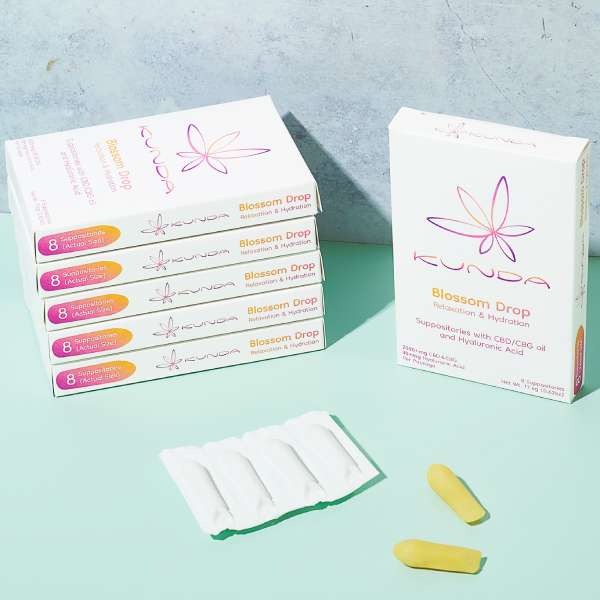My Top 3 Recommendations for Managing Pelvic Pain
By Casie Danenhauer Humble
DPT, Co-founder Kunda
As a pelvic floor physical therapist, I have the privilege of working closely with individuals who navigate the complex challenges of pelvic pain, including those living with endometriosis and adenomyosis. The conservative estimate is that at least 10% of people with uteruses worldwide struggle, and the profound impact that this condition can have on physical, emotional, and social well-being is startling. In honor of Endometriosis Awareness Month, I feel compelled to share my top 3 tools for those struggling with endo to help improve quality of life.
Endometriosis often presents as a collection of symptoms ranging from chronic pelvic pain and menstrual irregularities to digestive issues and infertility. Despite its prevalence, endometriosis remains widely misunderstood, but clinically we know that decreasing the overall inflammatory load and stress response in one’s body can have a very positive impact on the level of disability or suffering one experiences. There are many ways to do this and everybody responds differently to different tools so here are my top 3 recommendations.
1. Pelvic Physiotherapy
Working with a skilled pelvic health PT can make all the difference. They will be able to give you an individualized care plan aimed at pain relief/management often involving a mix of internal and external manual therapy, therapeutic exercise which often focuses on “down-training” or relaxing the pelvic floor and abdominal muscles, and a home program tailored towards your needs.
2. Restorative and Mindful Yoga and/or Yoga Nidra
These are two type of yoga focused on slowing down and activating the parasympathetic nervous system (so you can rest, digest, and heal). Chronic pain and the stress of navigating a chronic illness can keep us in flight or flight mode and taking active rest can be key in creating moments of quiet for your nervous system.
3. Cannabis (CBD)
Is emerging with tremendous promise in the realm of pelvic pain management.
*Fun fact: It is said that Queen Victoria used a cannabis tincture to treat her period pain in the 1800s! CBD can be used in many forms from topical balms and salves to yummy gummies or tinctures taken by mouth, but my all-time favorite and most direct use of cannabis is right to the place of action via a suppository.
Let’s get nerdy for a moment. We have a whole system hardwired inside of us designed to interact with cannabinoids because they are a molecule the body actually makes on its own. Our endocannabinoid system (ECS) is a system naturally occurring in the body to help regulate almost every other system (think digestion to immune nervous systems). CBD can actually help us to use our own cannabinoids better.
A CBD-infused suppository (used vaginally or rectally) offers a unique pathway for delivering targeted relief to the pelvic region. As part of the ECS, we have cannabinoid receptors located all throughout our bodies. There’s a particularly high concentration of receptors in the muscle and lining of the uterus so using a suppository vaginally has a localized effect in addition to being absorbed into your bloodstream.
CBD-focused research is catching up to anecdotal experience, but is quickly gaining clout in its possibilities to work as an analgesic (relieving pain), antispasmodic (relieving muscle spasm), anti-inflammatory (reducing inflammation), and anxiolytic (reducing anxiety).
- Pain Relief: Chronic pelvic pain is a hallmark symptom of endometriosis, often debilitating and profoundly affecting daily life especially while bleeding or ovulating. CBD’s analgesic properties are helpful in reducing pain and inflammation. I often suggest using CBD in the days leading up to menstruation to “get ahead” of any pain that might be coming and then continuing as long as pain is present
- Muscle Relaxation: Endometriosis-related pain is frequently accompanied by muscle tension and spasms in the pelvic floor, pelvic girdle, abdominal, and back muscles. CBD has been shown to possess muscle-relaxant properties, helping to alleviate tension and promote relaxation in the pelvic region. Through the use of CBD suppositories, individuals can experience relief from the cramping and tightness that often exacerbate pelvic pain, facilitating greater comfort and flexibility in daily activities including more comfort and pleasure during sex. I’ve found this works quite well in conjunction with manual therapy and a self-massage home program.
- Inflammation Reduction: Endo is characterized by chronic inflammation. CBD’s anti-inflammatory effects offer a promising avenue for mitigating inflammation. By delivering CBD directly to the affected area via suppositories, individuals can target inflammation at its source, potentially reducing the severity of endometriosis symptoms. Diet also plays a key role in managing overall inflammatory load.
- Hormonal Balance: Hormonal imbalances can play a significant role in the development and progression of endometriosis, with estrogen often exacerbating the growth of endometriosis. CBD interacts with the body’s endocannabinoid system, which plays a key role in regulating hormonal balance and reproductive function. Through its regulatory effects on the endocannabinoid system, CBD suppositories may help restore equilibrium to hormonal fluctuations.
- Emotional Support: Living with endometriosis can take a toll on mental health, leading to feelings of anxiety, depression, and emotional distress. CBD has shown promise as a natural remedy for anxiety and mood disorders, promoting feelings of calm and relaxation. By addressing both physical and emotional aspects of endometriosis, CBD suppositories offer a comprehensive approach to well-being, empowering individuals to navigate their journey with greater resilience and optimism.
Dr. Sherine Aubert, DPT, PRPC and I founded Kunda as a way to incorporate a natural high quality, high potency CBD product into our plan of care for our patients with pelvic pain. We feel passionate about supporting the endo community and promoting pelvic health for all through a holistic approach.
This is not meant as medical advice. Consult with your pelvic health professional for an individualized and tailored health plan.
Dr. Casie Danenhauer Humble, DPT is owner of Enlighten PT: Conscious Care for Pelvic Health, and co-founder of Kunda, a pelvic wellness/suppository brand. Dr. Casie works from an integrative and holistic approach privately for PT, educates through pelvic health wellness events, and hosts Retreat to Your Root retreats and workshops around the world.
To learn more about Kunda, click here. Use code PHS10 for 10% off your first order.


